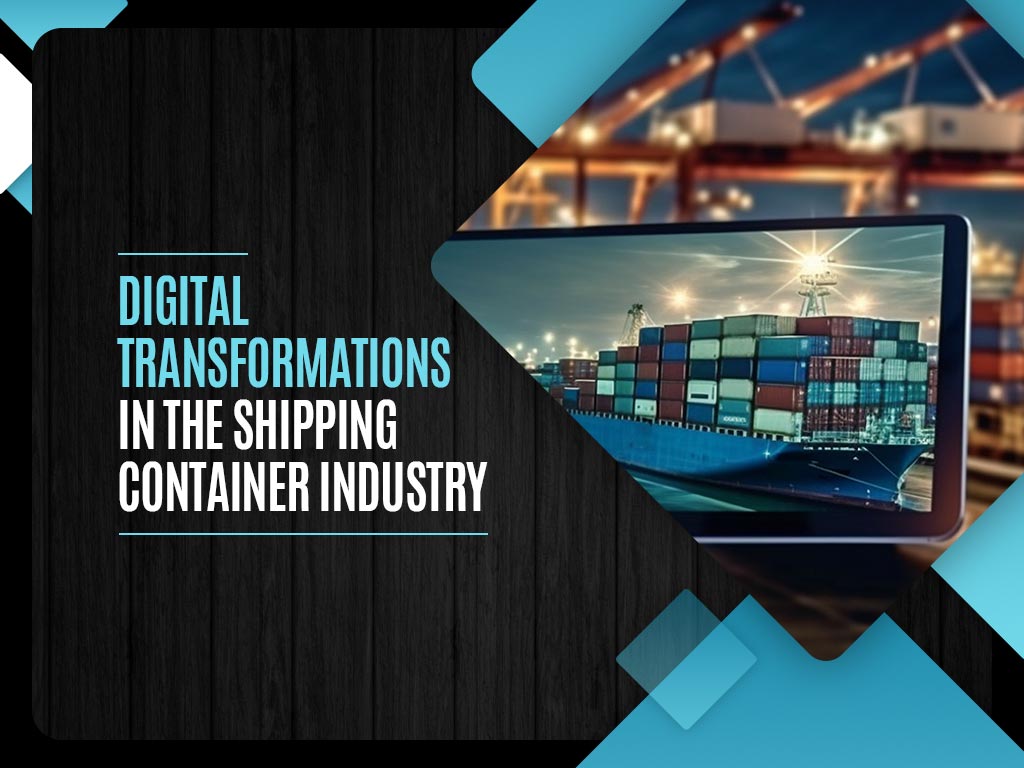Digital Transformations in the Shipping Container Industry
Discover the potential of digital transformations to increase efficiency and reduce costs for businesses in the shipping container industry.

Digital Transformations are the need of the time. The shipping container industry is pretty straightforward: it’s about getting goods into containers and loading them onto ships, that ferry them across the sea to a destination. The containers are then offloaded, the goods taken out and sent on to the wholesalers or other relevant parties.
Naturally, it’s not quite as simple as that: there are many factors and stages affecting the way in which a business will use a shipping container system to move goods. The trick is to make sure all these elements work together.
Digitalizing the shipping container industry means that all the pieces that make up this big puzzle can be controlled by efficient, information-hungry, and communicative systems. These are able to streamline the processes that are followed and make the shipping container the center of a wholly transformed industry.
Is Digital Transformations of the shipping container industry necessary?
The shipping container industry relies heavily on a lot of processes that work together – as well as some elements that cannot be controlled, such as the weather.
In terms of the operation of the industry, digitalizing will enable the different elements and processes to be brought together and more easily controlled in relation to each other. This will make the operational aspect of the industry more efficient.
Then, there is the question of the stakeholders being kept informed in real-time about the voyage, which has a whole range of advantages.
In short, digitalizing the shipping container industry means streamlining the whole industry and making the working much more efficient.
Advantages of Digital Transformations in the shipping container industry
Digitizing the shipping container industry has increased the operational efficiency of all the systems. It’s also made the industry more competitive.
One of the keys to the shipping container industry is organization and scheduling. Digitalizing the industry will make this aspect of operations much more efficient.
There are also environmental advantages, as the digitalization enables the providers to lower their carbon footprint. In fact, within about 40 years, the international shipping industry should achieve zero emissions.
Digital systems mean that the shippers and any other individuals involved in the container industry will receive data in real-time, so they can make decisions about the containers’ journey. The net result of this is the whole process becoming more and more efficient.
One of the effects is that the shipping routes can be streamlined. This means that the operators can predict what lies along the proposed route, read information about the weather and conditions of the sea, and how the ship is performing. This will allow them to control the route the ships take so they can save fuel, which saves costs in the long run.
Digitalization means increasing efficiency
If the entire container shipping process is digitalized, then this will include processes such as moving, loading and unloading of the containers. Not only will this make the processes more efficient, but it will also save on labor.
If entire container terminals are digitalized, then the efficiency of the industry will be improved. The automatic systems can run 24 hours a day, so the time spent working is almost doubled. This means more containers moving more often, which will cut down the delivery time of containers.
Digitalization of the container industry benefits the customer
With digitalization, customers using container shipping services will be able to track their cargoes in real time. This will reassure them about the state of their goods, which means they will be more confident in the service being offered to them.
Perhaps even more importantly, customers will be able to predict the delivery time of their goods. They can then arrange what needs to be done with their cargo in port. This saves time and money, as the goods can be delivered either on time or even earlier.
If the customer finds out about any delay of the container ship en route, due to the weather or condition of the sea, they’ll be able to adjust their schedules accordingly. They can also keep the stakeholders on their supply chain informed, which builds confidence.
Another distinct advantage for the customer is that just about everything can be done online: booking, arranging details, and making payments. This makes the whole experience more businesslike, quicker and easier.
Data drawn from digitalization helps stakeholders make informed decisions
If you run a business, such as freight forwarding, and can be informed at every stage of what your business does, you will have a distinct advantage – over both your competitors and elements that could disrupt the processes.
The way you are informed is via the data that digital systems gather. In the container shipping industry, this date relates to every stage of the process of forwarding freight – literally from the beginning to the end.
Having all this data means the businesses are able to make decisions based on real-time information.
Looking to sky-rocket your digital transformations in a matter of seconds? Here are 5 marketing automation tools that will help you achieve your goals.



